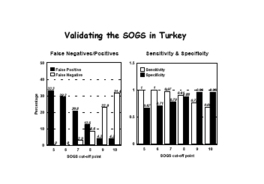The WAGER, Vol. 3(17) – Validating the SOGS in Turkey
The process of validating a screening instrument among a new population is complex. This process involves administering the screen to the new population to determine if the instrument can discriminate between positive and negative “cases” that represent the construct of interest among the new population. If the screen does not perform well with the new population, there may be socio-cultural or other differences preventing the screen from being as relevant as it was with the original population. Researchers recently investigated the effectiveness of the SOGS compared to the DSM-IV diagnostic criteria among a Turkish sample in Turkey [1]. Gambling is forbidden by Islam, the predominant religion in Turkey, and prohibited in public places by Turkish legislation. However, in the past decade a variety of gambling activities have become available, including 76 casinos nationwide [2] and state-sponsored lotteries, and legislative changes have been made. Although casinos originally were opened in 5-star hotels to attract tourist dollars, in 1991 a new law allowed Turkish citizens to enter and gamble in these casinos. A sample of 59 Turkish gamblers who were identified as people who “could have gambling problems” were recruited for the study. According to the DSM-IV, 29 (82%) of the sample screened positive for pathological gambling. There were no significant demographic differences between the group who met DSM-IV criteria for pathological gambling and the group who didn’t meet the criteria. All subjects were then given the Turkish-language version of the SOGS. Criterion validity of the SOGS (with a cut-off of 8 indicating pathological gambling rather than the usual score of 5) was high when correlated with the DSM-IV (kappa = .789). That is, the Turkish version of the SOGS seems to be measuring the same phenomena as the DSM-IV. The cut-off of 8 items was selected on the basis of the false positive and false negative percentages associated with various cut-off options (see chart below). Item analysis revealed that some (4 of 20) of the SOGS criteria were not able to discriminate between pathological and non-pathological gamblers. For example, “committing illegal acts” to support gambling activity did not discriminate between pathological gamblers and others because failing to repay borrowed money or a loan is not regarded as an illegal act in the same way that it is in the U.S. These researchers conclude that the Turkish-language SOGS can be used as a valid instrument in identifying Turkish pathological gamblers. However, high agreement with the DSM-IV does not necessarily mean that either the DSM-IV or the SOGS is valid. Rather it means both provide a similar index of the underlying phenomena.
Sources:
- Duvarci, I., Varan, A., Coskunol, H., & Ersoy, M. (1997). DSM-IV and the South Oaks gambling screen: Diagnosing and assessing pathological gambling in Turkey. Journal of Gambling Studies, 13(3), 193-205
- Bos, R. (1998, February). Turkey in turmoil. International Gaming & Wagering Business, 19(2), 15, 18-20.
This public education project is funded, in part, by The Andrews Foundation.
This fax may be copied without permission. Please cite The WAGER as the source.
For more information contact the Massachusetts Council on Compulsive Gambling,
190 High Street, Suite 6, Boston, MA 02110, U.S.
